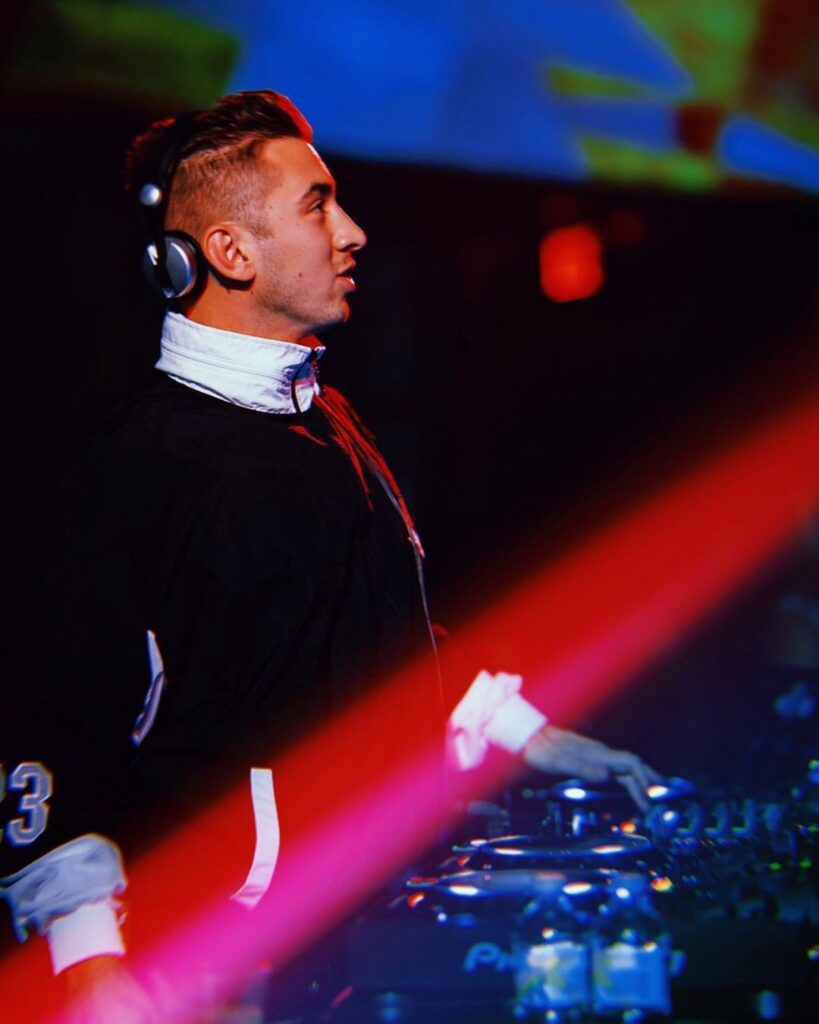The Hometown Hustler: DJ Politik Talks Parties, Producing & How LA Has Shaped Him As An Artist
- By: Ashley Joy Parker
- January 12, 2024
“As DJs, we are kind of like these scientists of music…..” -DJ Politik
Los Angeles is a city of DJ transplants. Countless of aspiring musicians come to Hollywood every year in hopes of spinnin’ for the A-List crowds at the hottest venues. However, there are the few LA natives who have been immersed in the city’s diverse music landscape from the jump and operate on a deeper level when it comes to sound and style.
DJ Politik is one of those rare LA kids who came up through the clubs in what some consider Hollywood’s golden party era of the 2000s/2010s. Inspired by the likes of DJ AM and Steve Aoki, Politik got the itch to jump behind the decks early on where he quickly learned to harness his eclectic taste and versatility into being a killer performer.
Over the past decade, Politik has become a permanent fixture at top nightclubs throughout LA and the world, including multiple Las Vegas residencies and high-profile events for global brands, including Coachella’s hottest party Neon Carnival.
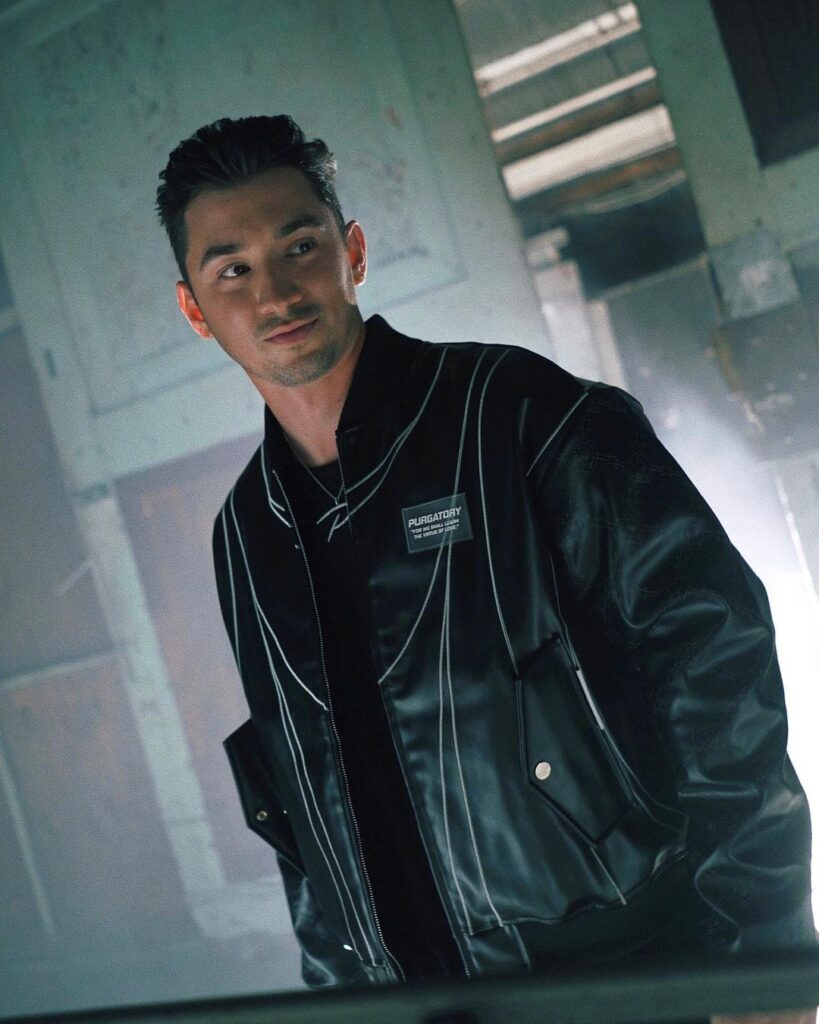
But beyond being a party purveyor and superb sound selector, Politik has evolved into an esteemed record producer and artist himself, with a captivating sound that lives within the realms of pop and dance music.
Loop Magazine recently caught up with the LA native where he opened up about his hometown’s nightlife scene, his evolution from DJ to artist/producer, his wildest onstage memory and more. Check out our exclusive interview with Politik below.
Tell us your origin story.
I grew up in LA. I’m an LA kid. I was going out to clubs in high school. Sneaking into clubs and seeing guys like DJ AM and Steve Aoki playing Hollywood bougie clubs, then there were sweaty underground rave dance parties. It was a really fun time in LA: pre-social media, pre-camera phones. I used to roll around with a digital camera and disposable cameras and take photos. Those are literally the only memories I have from that era. But that’s how I came up. I came up during that era, started playing in Vegas, all over the country, all over the world, doing events, clubs, and now putting records up.
Where does the name Politik come from?
My actual name is Paul and when I was in high school, or even junior high, I was getting into DJing and thought, “I need a DJ name.” I was with some friends and we were trying to think of a name that had Paul in it. So Paul-Politics, but Politics is weird. Let’s drop the “s,” change the “c” to a “k” and we got “Politik.” A lot of people think it’s named after the Coldplay song, “Politik” that was on their album that had “Clocks” and “The Scientist” on it. I love that album, but no, I was not named after that. It’s just a name I took in high school and ran with it.
How has being an LA native shaped you as an artist?
LA definitely influenced my music, my taste specifically, because LA and New York were the two cities where DJs started playing all different genres in one set. Up until I want to say the mid-2000s, DJs were kind of segregated. You were either a house DJ, or you were a hip hop DJ, or you were a drum and bass DJ, or you were a wedding bar mitzvah DJ. There were really no club DJs who were taking these different genres of music and somehow making them all work and implementing the technical side of DJing, like blending and scratching and doing all these tricks.
Growing up in LA and being exposed to that really shaped my taste because it was so many different styles and genres of music that I was hearing when I was going out to clubs. It was shaping my perspective as a DJ. Most DJs start out and they have one specific genre, but growing up in LA and I was able to be privy to this new style of DJing since I was really young. I came up during the golden era of club DJing or what is now known as open-format DJing. It wouldn’t have happened if I had grown up anywhere else.
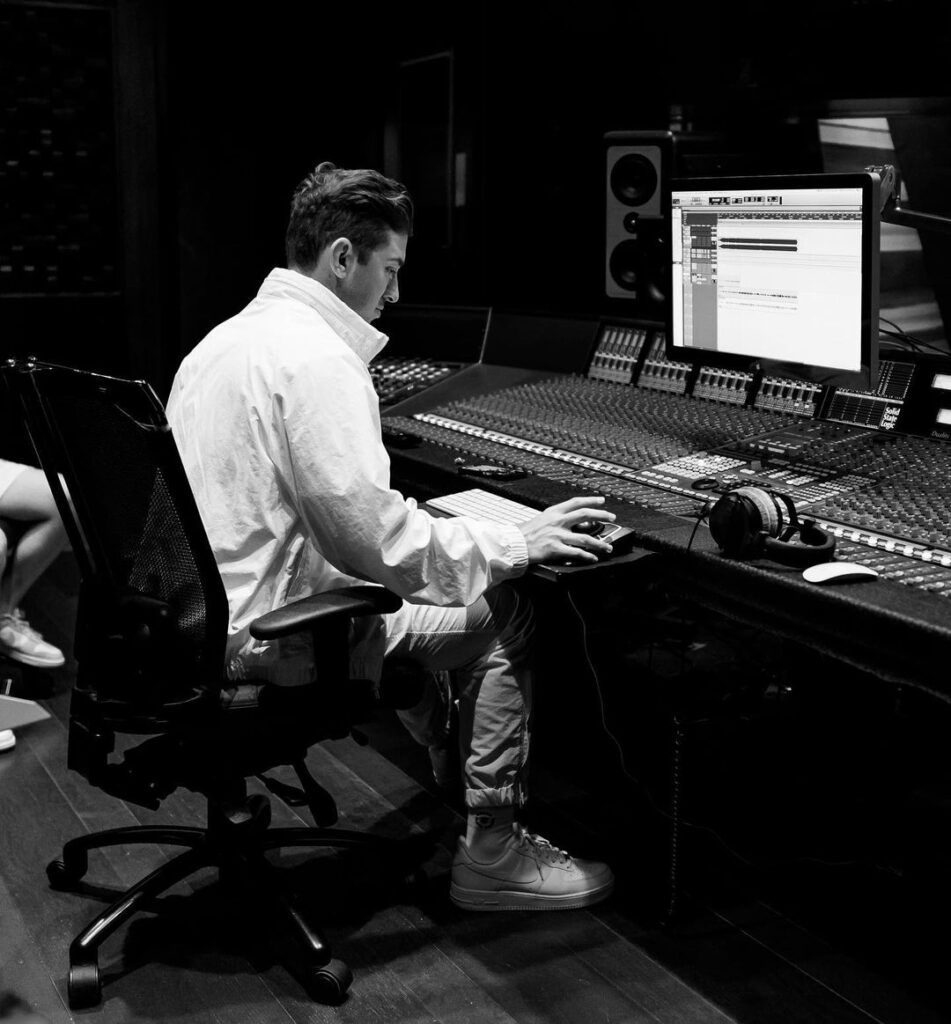
Do you remember your first gig?
Yep. I was filling in for one of my friends at a club on Beverly Boulevard and San Vicente, right by the Beverly Center. It was called Guy’s. Now it’s The Peppermint Club, which is a live music venue owned by the h.wood Group. I was probably 17 and I think I got paid like $200. I was stoked and from there, I just started grinding, filling in for more DJs, building relationships with some of the people that were running the clubs and promoters. But I do remember, very specifically.
Tell us about your evolution from DJ to producer?
The evolution from DJ to producer is one of those things that comes very naturally. It’s like a right of passage. As DJs, our job is to study music. We figure out what records work, what parts of those records work, what parts of songs people sing along to, what parts of songs get stuck in your head. As DJs, we are kind of like these scientists of music. It makes sense for you to be like, “all right, why don’t I just make music.”
For me, it was a longer transition than it would normally be because I was already touring a lot. I was really successful as a DJ who was playing other people’s music, making good money, traveling. There really wasn’t much time for me to spend in the studio constantly, figuring out what I want to focus on and really figuring out what my sound was. It’s really a catch-22 when you are a good open format DJ because you know so many genres so well, you know how to play in any situation you go into. So when you’re in the studio trying to figure out what music to make, it’s kind of like, “ok well, I can make hip hop beats or I can make a dance beat or I can make some kind of mid-tempo Latin afrobeat-inspired beat.”
It really boils down to finding the songs. I started working with songwriters. I want to make songs, not just instrumental beats, I want to collaborate with artists and make real records. It took a while to learn how to be a producer. When people say “producer,” they think a producer just sits there and makes beats. That’s not a producer, that’s a beat maker. It takes time to understand how to communicate with a songwriter or with an artist; how to speak the same language as them when you’re writing music, when you’re writing melodies, when you’re writing lyrics, structuring the songs; being a good engineer, being able to communicate, if you’re hiring an engineer to record and mix for you, being able to communicate with the engineer, etc.
It’s been a very long process and I’ve been very hands-on with it. I didn’t want to just put out songs that I just bought. I really wanted to learn how to produce and learn every part of the process. And it took a long time, but here I am and we’re putting out records. It’s been a fun journey learning and diving into the process of producing.
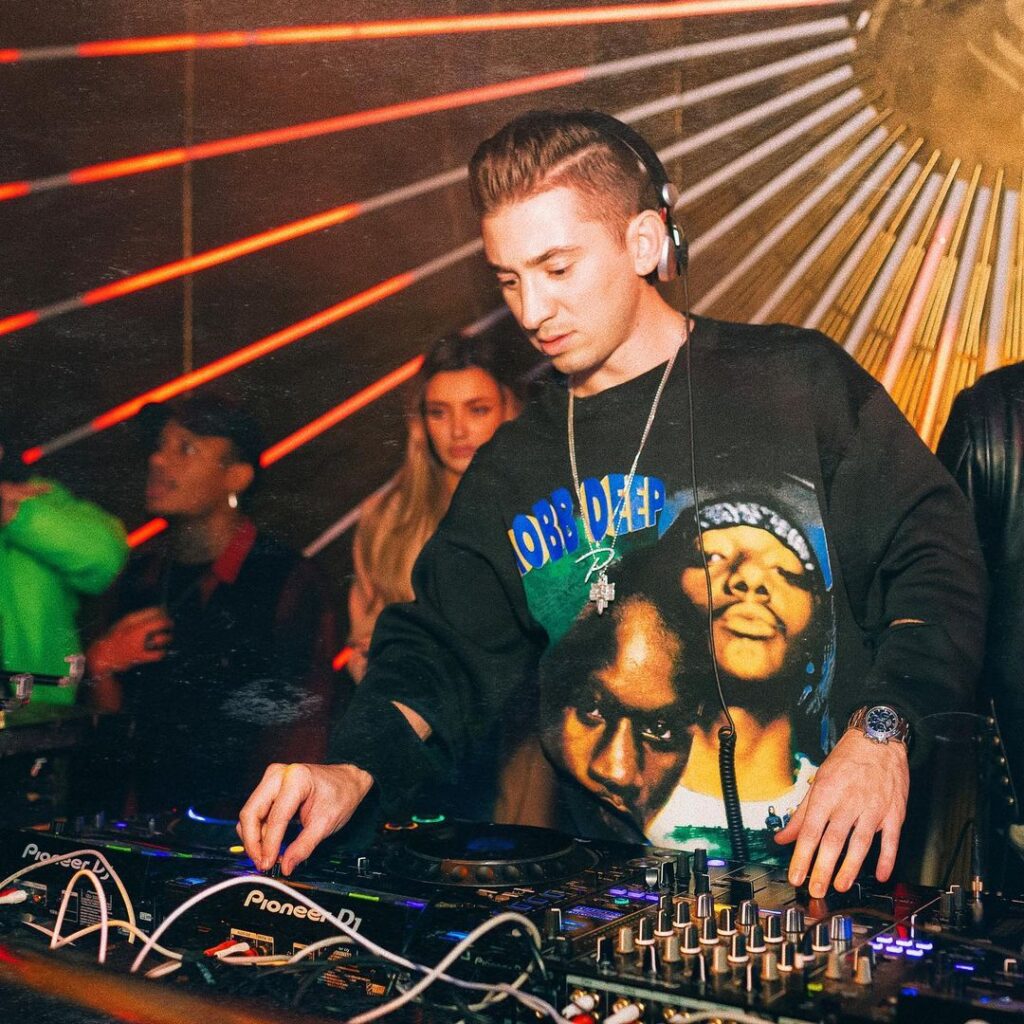
You’ve had a few high-profile Las Vegas residencies. What’s the biggest difference between Vegas crowds and LA crowds?
The Vegas crowd is ready to turn up. They’re in Vegas, ready to get wasted, blackout, dance, do something they probably will regret. In LA, at least the places I played growing up and these past few years, it’s more bougie. More high-end bottle service clubs where people are there just to be seen. They are on their phones, they aren’t there to really let loose and party and dance like a crowd in Vegas or Miami. LA nightlife, they’re not really turning up. They’re not dancing. Most of the clubs don’t even have a dance floor. When I was growing up in LA, all the clubs had a dance floor. People would go and dance, now it’s just bottles, whose table are you at, how many girls are at that table.
Let’s talk about your track, “Wolf” with DeathbyRomy. It’s haunting AF and you released it in the middle of the pandemic. What was it like creating music at that time?
“Wolf” was in 2020, right in the middle of the pandemic. I had been working DeathbyRomy. We had some sessions and I was a huge fan of her music. We had this record and it was really spooky and dark. I had the vision for the video and it was right around Halloween, so we marketed it as a Halloween record. Everything was closed so there were no clubs, no events. I wasn’t touring at all. There was no end in sight really, so it was one of those records I found and was like, “let’s put it out and just test the waters.”
I put that record out independently, but I was able to get it on some big playlists on Spotify and Apple. Everything’s been a learning process and especially when you’re an independent artist, I think it’s very important to learn when you put records out, learn from your mistakes, learn where you should be spending money, what content you should be making and apply that to all the next releases you do.
Your latest single single, “Disconnected”
“Disconnected” came about, funny enough, when I went to see FAANGS at The Peppermint Club, where I had my first DJ gig like 15 years before that. I hadn’t heard of her and I had never met her. I saw some people posting her music and my manager took me to her showcase and I was really blown away by how talented she was, by her live performance, her style and just the way she carried herself on stage. I really wanted to work with her. My manager was able to set that session up and we totally hit it off. She’s super cool, a very talented songwriter and artist. She was an actress as a kid, so she’s just a very multi-hyphenate talented person and we wrote some ideas originally that we are still working on finishing.
We have a bunch of songs that we did together. This one in particular she played me was a demo, it was a one minute clip, so just a hook and that vocal chop and a very short beat that she worked on with a different producer, a guy named Phil Scully, and I thought there was something special about it. We hit up Phil, set up a session for the three of us and we finished the song. That’s how it went down.
I really do enjoy collaborating with other producers. A lot of producers start ideas and then they don’t finish them, but my hard drive is full of those types of ideas. There could be some magic in that idea when you send it out or someone else hears it. They can have a whole new different perspective on it and can get that song to the finish line. I like working with other producers because they always have little ideas, maybe one hook, one riff that really just inspires me and hits me. I like taking that and building on it.
I’m super proud of how the video came out. I was very lucky to get introduced to Mike through my manager who worked with him on some of Saweetie‘s early videos. I was DJing at Zouk in Vegas and I flew Mike out. We had just met on FaceTime and I wanted to get to know him and bring him into my world, have him see one of my shows. And we hit it off. We actually found out his mentor is a guy named Jessy Terrero who I’ve known since I was a kid. He used to see me DJing out in all the LA clubs over the years and he’s one of the best Latin video directors in the world. I had no idea he was Mike’s mentor so that brought us even closer together. Mike came up with the concept, he sent me a treatment and we did a few little adjustments, but really it was all Mike. He’s really a genius. He’s so hands on, from conceptualizing to the camera work and he edits everything himself. I’m really blessed he was able to work with me as a new artist. I still talk to him every week. We are working on ideas for my next single.
Tell us your wildest onstage memory.
I DJed this party for many years called Neon Carnival during Coachella. It started out as the T Mobile Party like 15 years ago. DJ AM used to play it with Steve Aoki. It was at the Thermal airport, which is like 30 minutes from Coachella, and then it evolved into Neon Carnival, which is the biggest party at Coachella every year. Well, now it’s the biggest, but when I started DJing it, it was pretty intimate, pretty tough to get into. It was insane for many, many years.
One of the years, 2016 or 2017 maybe, one of my friends brought Gucci Mane to the party. He had played the festival earlier that night. My friend brought him on stage, but he had a little issue getting him in. It wasn’t as smooth as Gucci would have preferred it, so he wasn’t in the best mood. My friend who brought him said he would potentially perform a song so he came up on stage, he was hanging out and I kinda tried to get him to perform a couple different times and he wasn’t having it. I was drinking my Don Julio 1942, I was feeling really confident and after two times of him declining to perform I basically just shut the music off and I said, “Gucci, we’ve got to give the people what they want,” and he looked at me like he wanted to kill me. He had just gotten out of prison actually, so I just moved on.
The next day, I was with my friend who brought him and Gucci calls him and he put him on speaker and he said, “Your friend that was the DJ at that party, he’s got balls.” He said, “he’s lucky that it wasn’t the old Gucci and it’s the new Gucci.” So basically I almost got myself killed at Coachella trying to force Gucci Mane to perform. It was one of those moments with other artists that you have to tiptoe and be careful. Don’t force them to do things they don’t want to do. But you know, I was feeling confident that night.
You are a Don Julio ambassador. How do you enjoy your tequila?
Neat or on the rocks. 1942, of course. I guess a margarita is cool or maybe if I’m doing a mixed drink, a tequila soda. But nothing too sweet and sugary. I like to taste the tequila. It’s really smooth.
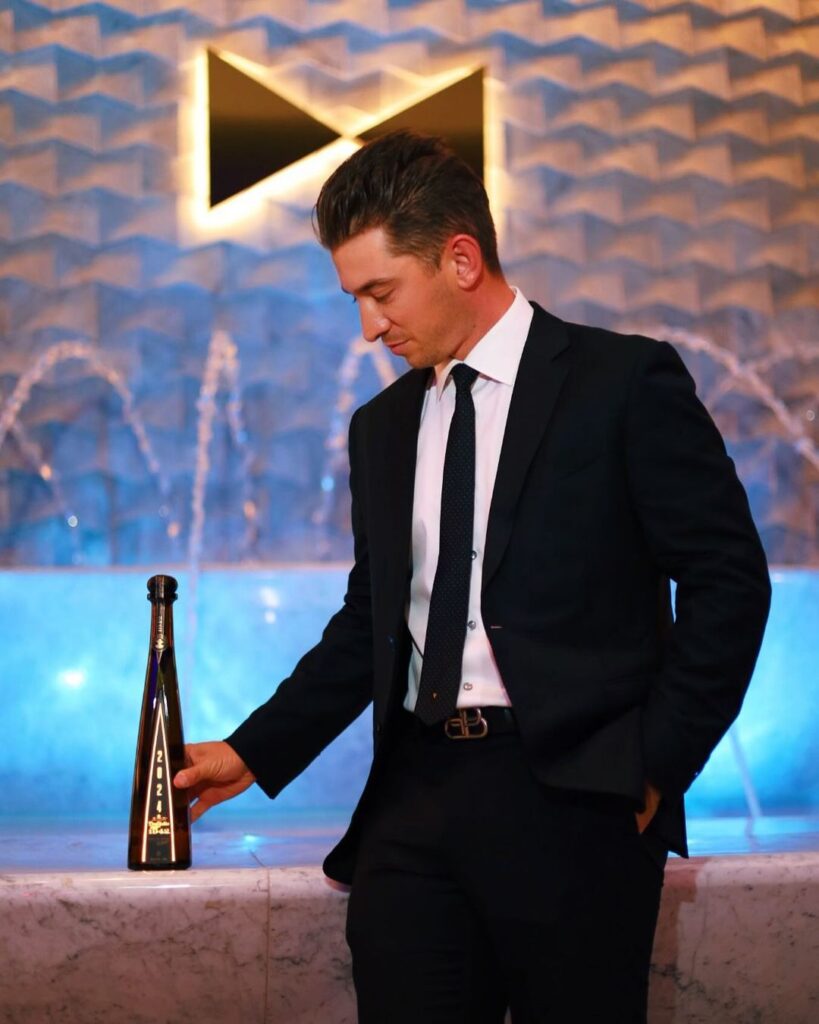
What’s your biggest pet peeve as a DJ?
The number one thing that annoys me, and I’m sure I speak for many many DJs, is the constant Bad Bunny requests. I don’t even know if we’re getting trolled at this point or what it is, but the requests are only Bad Bunny. There are no other artists that girls, mostly it’s girls, want to hear. Before, at least it was like, “can you play this or can you play that,” but no, now it’s only Bad Bunny. And I will play Bad Bunny, but as soon as you start asking me to play Bad Bunny, I’m not playing Bad Bunny. Sorry.
Is there a specific gig or venue to play on your bucket list?
I’ve always dreamed of playing one of the big stages at Coachella. That’s definitely at the top of my list as far as goals. I just played my first big festival in Michigan called Electric Forest and that was a blast. I really enjoy preparing for those types of sets. You really get to put on a show.
Where is Politik at 2 a.m.?
I hate to sound boring but probably at home, hanging with my fiancée and our two Bengal cats who we love—or in the studio, or playing poker maybe—one of those three. I would say playing golf but you can’t really play golf at 2 a.m.. At 2 p.m., I’ll be playing golf.
Follow Politik: Instagram | Spotify | X | Soundcloud | YouTube | Website
